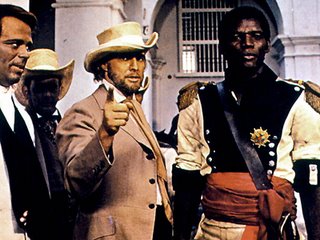
Last night, as part of our regular series of socialist films in Swindon, we showed “Burn” directed by Gillo Pontecovo. The Portuguese language version “Quemada” is unavailable, and in any event the original cinema release in Britain was dubbed, and in the curious way that spaghetti westerns work, the dubbing somehow adds to the exoticism and authenticity.
This is an amazing film, and Marlon Brando plays Sir William Walker, the same actually existing historical character who was subject of Alex Cox’s piss-poor 1987 film, “Walker”. (It was an tremendous conceit of Cox that he sought to surpass the Pontecovo and Brando film!) Rather improving upon history, Pontecovo makes Walker an Englishman, an agent provocateur who stirs up slave revolt and a movement for national liberation from Portugal, in the interests of the British crown and sugar companies.
Nothing is simple, as Brando creates his own Toussaint Louverture, by manipulating a slave rebellion, under the leadership of amazingly charismatic actor, Evaristo Marquez. Simultaneously, he coaches the slave owners towards recognising the advantages of wage labour and independence, and the necessity of heading off the slave revolt into constitutional paths. In arguments of acute contemporary relevence when the film was made, the victorious slave army find that their cultural poverty undermines the potential of their victory over colonialism - they simply need the expertise of the former slave owners.
Brando pulls off an amazing role, because he is both historically convincing as a charming agent of perfidious Albion, while at the same time his part allows him to express in words, for the benefit of the audience, the developing realisation of their class interests by the capitalists and rebellious slaves. Had the role been played by a lesser actor (Ed Harris in "Walker", for example!), this would have been creaky, but the animal presence of Brando leaves no room for scepticism.
Ten years later, Brando returns as the agent of the sugar companies, and provokes a coup, the introduction of British troops, and a classic Vietnam style counter-insurgency war (The film was made in 1969!) to destroy the guerrillas, who have taken to arms again once they realise that wage labour is just another form of slavery. The final victory goes to Evaristo Marquez, who choses to hang, rather than be given freedom at the whim of his conquerors, thus he keeps the spirt of rebellion alive. As his fictional character, General Jose Dolores, explains: freedom is not worth having if it is given, it has to be taken.
It is inexplicable that this film is so little known.
9 comments:
BURN and the Battle of Algiers are the top political films I reckon -- and maybe Z --which aren't just simply radical in their politics but overpower you with their creativity. Even the music in Burn is --well --haunting.
Unlike the The Battleship Potemkin, October, etc BURN still speaks to us in the language we know.
And it's so well plotted. The scene after the first attack when Jose Delores is asked what he wants to do now and is mesmerized the celebration of freedom in the dance..or the scene in the brothel where Brando's character explores the economic differences between slavery, prostitution and creating a working class... or when the rag tag army marches across the beach to hand in their weapons... or the search and destroy operation in the sugar cane fields... or the carnival masquerade... even the lead in during the film's first few minutes as the ship approaches Quemada and we learn why it is called BURN... "and the rocks were bleeched white by the bones of the slaves who revolted"...
Others may not , but I know the film.
..
wow Dave, you remember it better and me, and I saw it last night.
We were thinking of showing Z next season, but don't seem to be able to get it. Now deciding on whether to substitute "Missing" or "Music Box"
Go for "Missing"..... Fantastic film!
yeah - but I have a personal attachement to Budapest.
Indeed I made a speach to an anti-war demonstration there during the Serbia war at what looked like exactly the same spot on the banks of the Danube where the Jews were massacred in the film.
i didn't realise until afterwards, and felt spooked out by it.
oh - for those who haven't seen it - the references to Budapest are about the "Magic Box", and all three: Z, Missing and Magic Box were directed by Costas Garvas
Well, any of the 3 will be worth seeing as Costa-Gavras is great director who uses a documentary style of filming.
Btw: Z is available on DVD on www.amazon.com. Dunno if that helps. Moviemail is generally pretty good and has the majority of his films except Z.
I'd vote Z.
I was a strong opponent of the junta in Greece.
Somehow I thought you were younger than that Renegade, but Z is the best of the films
And yeah Loiuse it is on Amazon, but I am not sure that the pub's licence covers films distributed only in North America - we had trouble before with that. And as the venue is excellent and free, i don't want to upset them!
"And yeah Loiuse it is on Amazon, but I am not sure that the pub's licence covers films distributed only in North America - we had trouble before with that"
Yeah I did wonder about that.
Post a Comment